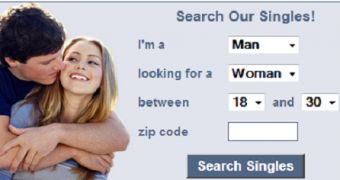This time of year many users may be tempted to turn to online dating sites to find someone to spend Valentine’s Day with. Unfortunately, many internauts are not aware of the privacy and security risks some of these websites expose them to.
The Electronic Frontier Foundation (EFF) made a list of factors that should be taken into consideration before making an account on such a website.
First of all, users should be aware of the fact that many sites don’t actually delete the data once an account is deactivated. Most social networks store the data on their servers in case the customer has a change of heart and decides to reactivate the account, but this practice has a lot of privacy implications.
Even if it’s not made public, the data can later be used in criminal investigations and other legal battles such as divorce cases. In the latter case, if the account holder had some incriminating information on the site, it can later be utilized against him/her.
An even bigger issue emerges when it comes to pictures. Since in most scenarios they’re hosted on servers outside the company, individuals who possess the picture's URL are able to access it long after the account has been removed from the website.
Another problem is that many dating services are highly vulnerable to hackers. For instance, a security hole found not long ago in the popular Grindr exposed millions of individuals.
While the next issue may not cause concern for some users, it’s good to know that search engines, such as Google, index online dating website profiles if the privacy settings are not configured properly.
An important thing to take in consideration is that all the information made available on a dating site represents a gold mine for shady marketing companies and cybercriminals. They can use the data to send targeted advertisement campaigns or malicious messages that point to affiliate marketing schemes and even pieces of malware.
Social media websites began implementing HTTPS support for their services, which is a good thing when it comes to protecting the customers’ browsing history, messages and other data. Unfortunately, many online dating sites are experiencing difficulties with the implementation of HTTPS, leaving their customers exposed.
So what can be done to prevent all this?
Before registering an account, make sure to read the privacy policies to determine if the site suits your needs privacy-wise. Usually this policy provides information on how long deleted data is actually stored, whether or not marketing companies have access to it, and if the information is indexed by search engines.
The next step is to check all the privacy and security settings. Verify that the HTTPS support is enabled on sites where it’s only optional and ensure that no one except for friends can see the profile’s content.
Besides this, you can take a few easy steps to protect you privacy. For instance, don’t use your real name, avoid using paid sites that store credit card information, and for those who really care about their privacy, the use of VPNs is recommended.
A final thing that should be taken into consideration is that the modern technologies used in photo identification services such as Google Image Search allow others to find you based on your picture, so even if you used a fake name, they may be able to track you down.
For more details, check out the EFF’s recommendations here.

 14 DAY TRIAL //
14 DAY TRIAL //